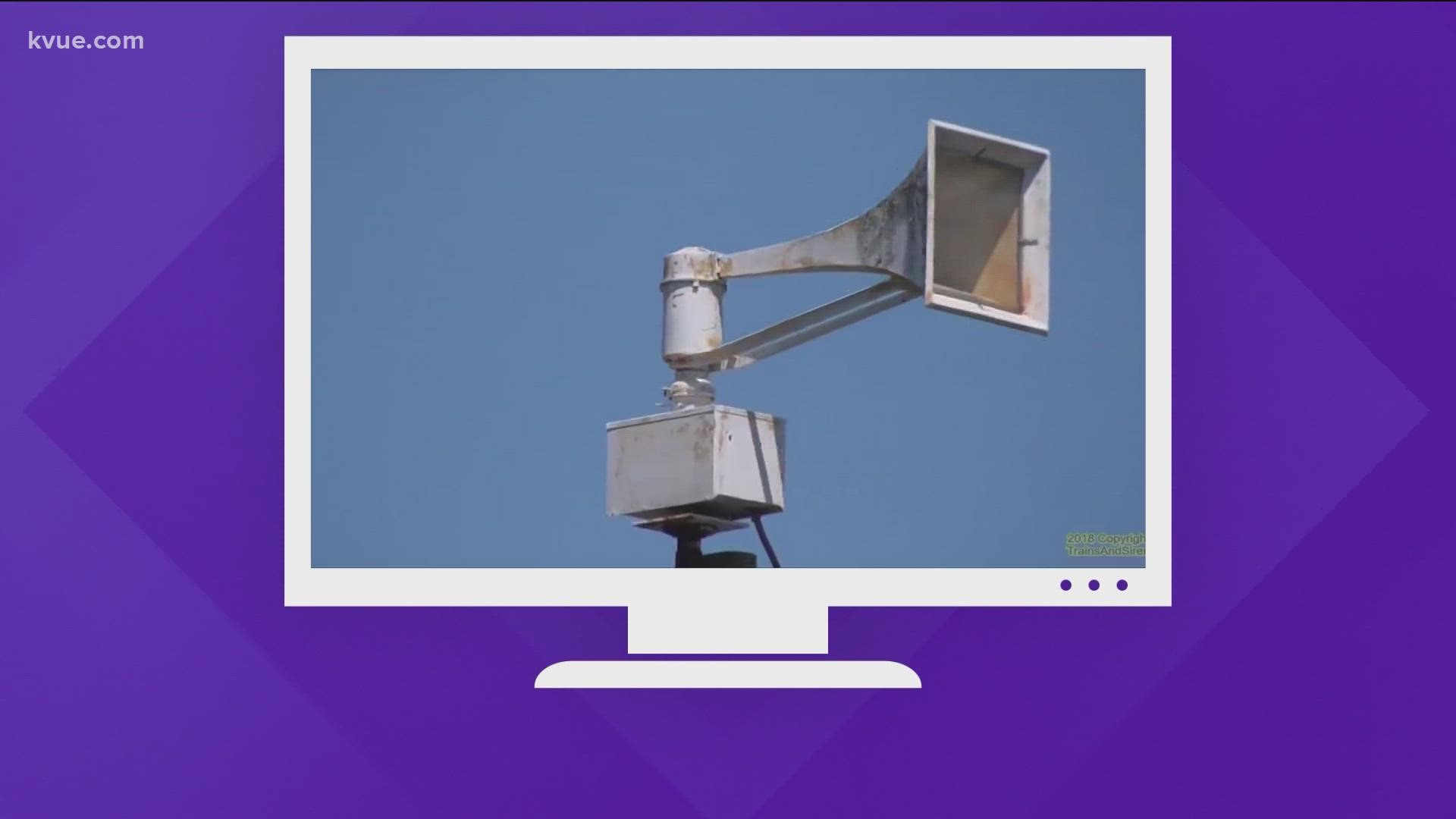AUSTIN, Texas — After a tornado touched down in Central Texas Monday night, Williamson County officials and Gov. Greg Abbott credited meteorologists for saving lives as the severe weather approached.
But some neighbors are wondering why they didn't hear a tornado siren.
When it comes to severe weather, the City of Austin does not have sirens, while the University of Texas at Austin has sirens that are tested once a month.
In Georgetown, the City’s 23 outdoor warning sirens are tested on the first Saturday of the month at 11 a.m. with two back-to-back, 60-second audible tests.
Williamson County Judge Bill Gravell said although tornado sirens are great tools to use, they're not necessary. Round Rock and Jarrell both do not have tornado sirens. Other Texas cities like San Antonio and Houston also do not have siren systems in place.
Many North Texas cities do have sirens, as they are closer to "tornado alley." Sirens are less common in Central and South Texas because it is fairly rare that those areas experience destructive, deadly tornadoes. There were a few injuries and no deaths from the storms that came through Central Texas on Monday, March 21.
"I think through this disaster, we have learned that the cellphone communication tools that are available and our local networks in the apps through the local TV stations play a vital role," Gravell said.
According to Paul Yura, a warning coordination meteorologist with the National Weather Service (NWS) at Austin and San Antonio, sirens are designed to be for outdoor use and are just one piece of the entire warning system.
"Sirens won't solve all the problems. Sirens are designed to be outdoor sirens, meaning that if you are outdoors, you will hear the siren," Yura said. "So, you have to consider if you are indoors, there is a high likelihood you will not hear that siren unless maybe the siren system is a couple hundred yards away from your house."
The NWS recommends having multiple ways of receiving alerts. One is the old-school route.
"The old-school way, and it still works to this day, is the technology called weather radio. Have a small weather radio in your house, that's a VHF signal," Yura said.
Another option is newer technology like social media and local news outlets' apps.
"Things like watching social media, watching the television and obviously having your smartphone, which has multiple different type of apps or different ways of getting those weather warnings. Some of them even come directly to your phone," Yura said.
If you were in an area on Monday that had a tornado warning in place, you should have received a forced and automatic alert to your phone, just like a flash flood alert or amber alert. If you did not, that means either a warning was not in place or you have your notifications turned off.
Yura said it is up to each city and county to implement a siren system and that there is a lot they need to consider.
"Some systems can be tied directly to the warnings of the National Weather Service, some have to be set off manually, some they'll have a couple of trigger points to where this person is allowed to set up the siren and only that person will. If that person is not available, who has the authority then to set off the siren?" Yura said.
The most important point Yura wanted to make is that you need to have multiple alerts and you need to have a plan in place before those alerts happen. He said that the NWS and local meteorologists had warned of severe weather for seven days ahead of the tornadoes and a Tornado Watch was issued earlier that day.
At that point, residents should have been in a place where they could easily access shelter because Yura said if you are driving on Interstate 35 and get an alert on your phone or hear sirens, there is not much you can do..
"Everybody kind of starts talking about sirens, especially after a tornado occurs. You have to think about how strong the tornado was – was there a big enough tornado that there was loss of life? And even if we do get a siren or you get that alert on your cellphone, what are you going to do with that? Do you have a preparedness plan? Because honestly, if the siren goes off or you get that warning on your phone and you don't do anything, then none of those sort of warning systems are going to help you," Yura said.
If you are wondering if there are tornado sirens in your area, you would probably know as they are tested either monthly or weekly.
PEOPLE ARE ALSO READING:

